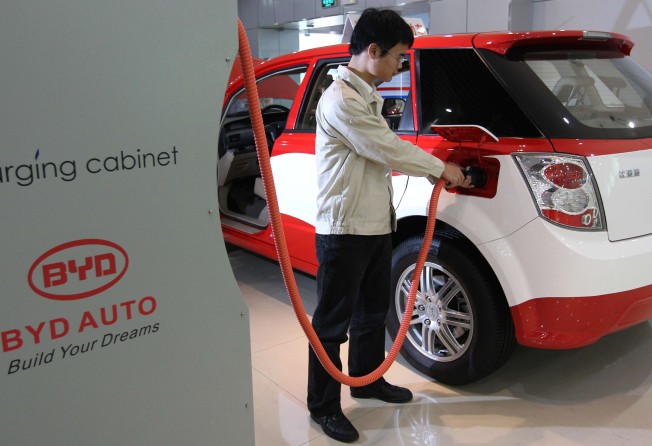After Hong Kong failure, China’s BYD joins Singapore to launch electric taxi fleet

Chinese automobile giant BYD, which is partly owned by Warren Buffet’s Berkshire Hathaway, is teaming up with the Singapore government to launch the first fleet of green taxis in the Lion City, one year after it branded its two-year e-taxi trial run in Hong Kong a failure.
“We are happy to lead the government’s ongoing push to use electric power for public transport,” Liu Xueliang, Asia Pacific sales general manager for BYD told the South China Morning Post. “Singapore is Asia’s Garden City where authorities are taking efforts to improve roadside air quality and reduce reliance on petrol.”
Scores of BYD’s E6 electric cabs are expected to hit the roads of the city state on Friday, to be followed by new product lines including battery-powered sightseeing buses, the Shenzhen-based company revealed. The E6 model claims a range of about 350km and a battery that requires 90 minutes to be fully charged.
This is not the first time the world’s No 1 electric vehicle maker by sales has attempted to extend its footprint beyond mainland China through alliances with regional governments that are combating air pollution and saving energy costs. Last year, the company delivered more plug-in electric vehicles than any other global brand, including Tesla, Toyota or General Motors, but the vast of majority of sales came from mainland China.
In 2013, the first batch of 45 green cabs manufactured by BYD started running on Hong Kong’s streets. At the time, it hoped to eventually replace at least a quarter of the former British colony’s 18,138 liquid-petroleum-gas-fuelled taxis with electric models.
Two years later, Ding Haimiao, assistant to the general manager of BYD, called the trial run a “failure” in front of a panel of technology industry figures from Hong Kong because “we lost so much money from it”.
Despite millions of dollars in government subsidies, the iconic green E6 taxis are nowhere to be seen today as a result of a backlash from Hong Kong taxi drivers over a lack of charging infrastructure and prolonged charging times.
“We found that e-cabs are not a good fit for Hong Kong,” said the city’s Environmental Protection Department when it called off the scheme in August.
Failing in Hong Kong doesn’t appear to have deterred BYD from “taking the lead” in Singapore’s switch to fossil-free mass transport, as industry insiders point out the government there has stronger executive power in carrying out schemes facing external resistance.
The city state saw its first green buses tested on a public route last year after the transport authority partnered with BYD to kick start a six-month pilot scheme, while a car-sharing model will also be adopted as part of the trial.
By 2020 the Singapore government aims to roll out a total of 1,000 electric cars to be supported by 2,000 charging points across residential neighbourhoods, key industrial and commercial areas and the Central Business District.
“The key to success [in Singapore] is strong government backing and supports from taxi operators,” said CLSA automotive analyst Alexious Lee.